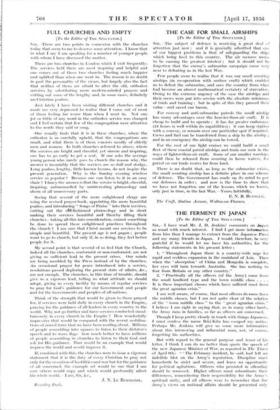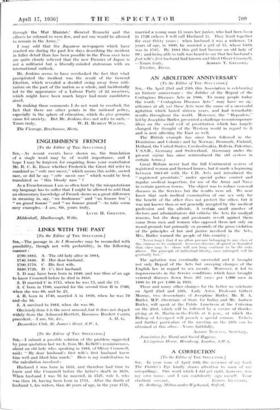THE FERMENT IN JAPAN [To the Editor of THE SPECTATOR.]
Sta,—I have read Mr. J. D. Jenkins' contents on -Japan as usual with much interest. .r find I 'get- lore information from him than I manage to extract front the. Japanese Press and my many friends in Japan. I would, therefore, be-very grateful if lie would let me have his authorities, for the following statements in his present letter :
1. "'Throughout Japan there is a country-wide urge for rapid and reckless expansion in the mainland of Asia. Then when the ' absorption ' of China and Mongolia is complete, her eyes will turn towards Australia. She has nothing to fear from Britain or any other country."
2. " Practically all the officers (of the Army) conic from the small landlord type and the town middle class , . . It is these important classes which have suffered:most front the great agrarian crisis."
I am well aware, of course, that most officers do come front the middle classes, but I am not quite clear of the relation of the '' town middle class " to the " great agrarian crisis." I believe I ant right in saying that, as in many other lands, the Army runs in families, so far as officers are concerned.
Though I keep pretty closely in touch with things Japanese, I must confess the name Ikki-Kita has escaped my notice. Perhaps Mr. Jenkins will give us sonic more information about this interesting and influential man, not, of course, forgetting his authorities.
But with regard to the general purpose and tenor of his letter, I think I can do no better than quote the speech of the new Japanese Minister of War, as reported in The Tinics of April 9th: " ' The February incident, he said, had left an indelible blot on the Army's reputation.- Discipline must henceforth be strict and severe, and leave no opportunity for political agitations. Officers who persisted in offending should be removed. Higher officers must subordinate their differences, remembering their responsibility for the Army's spiritual unity,' and all officers were to remember that the Army's views on national affairs should be presented only
tie through' the' IVar Ministei.,' nem Terauchi said the officers he referred to were few, and not one would be allowed to remain in the Army."
I may add that the Japanese newspapers which have reached me during the past few days describing the incident in fuller detail than has been possible in the Press over here are quite clearly relieved that the new Premier of Japan is not a militarist but a liberally-minded statesman with an international outlook.
Mr. Jenkins seems to have overlooked the fact that what precipitated the incident was the result of MC General Election, which revealed a decided swing away from mili- tarism on the part of the nation as a whole, and incidentally led to the appearance of a Labour Party of 22 members, which might have been much larger had more candidates stood.
In making these comments I do not want to overlook the fact that there are other points in the national policy, especially in the sphere of education, which do give genuine cause for anxiety. But Mr. Jenkins does not refer to such.— TheTk icar age, Brarbourne, Herts.













































 Previous page
Previous page